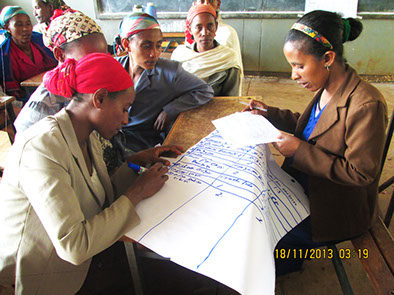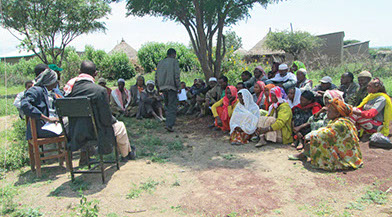‘I worked as school principal for the last 8 years, but it is in this school that I started to let communities participate on school issues. Social accountability helped me in this. In 2008 E.C. we did not conduct any meetings with parents and students. In 2009 and 2010, we conducted 2 and 4 meetings respectively with parents. This resulted in a positive change in students' performance.’
Debraso Primary School Principal (ADA monitoring)
‘Political authority was considered as something which is not open for accountability because assigning political leaders was understood as the role of the party alone. Now, the council has set a direction to assess the nominee’s acceptance by communities and their specific capacities.
The councils also agreed to conduct surprise visits to service provider institutions and sectors’
Ato Getinet,
Amhara Regional Council technical expert, commenting on woreda council training by ESAP at the regional FTA-SA meeting August 2018


Involving Citizens in Decision Making by strengthening local government
Featured Project
Ethiopia, Protection of Basic Services: Social Accountability Program (ESAP)
In 2018 the ESAP2 programme came to an end, after 7 years of strengthening Social Accountability Committees, supporting civil society organizations and strengthening the use of Social Accountability tools. In the end over 345,000 Ethiopian citizens held their service providers accountable in the five basic sectors in which VNG International works: education, health, agriculture, water and sanitation and rural roads; over 685 successful training sessions were conducted for civil society organizations; over 16.000 representatives of local government and basic service providers were trained on Social Accountability tools including participatory budget planning and gender mainstreaming; around 40.000 citizens were trained on how to approach service providers and over 264 Joint Action Plans (agreed on by citizens, service providers and local government representatives) were formulated and are being implemented in 223 local governments (or Woredas) to ensure improved basic service delivery. Besides the abovementioned results for the direct beneficiaries, ESAP2 also created a growing network of Ethiopian Social Accountability experts, ensuring the sustainability of Social Accountability in Ethiopia.
Based on these results the foundation for ESAP3 was built, and a World Bank Multi-Donor Trust Fund contract was won by VNG International in 2018. ESAP3 is composed of three major project components: Component 1 is the operational core of the project and includes the implementation and expansion of the Social Accountability tools and approach in kebeles and woredas.
It includes 2 sub-components:
- Grants to Civil Society Organisations to expand the uptake of Social Accountability to more woredas and kebeles;
- Grants or support to Civil Society Organisations of other government or non-government organizations to undertake innovative activities including testing social accountability tools in new sub-sectors, linking non-basic service issues to other citizen engagement initiatives, or addressing social accountability issues at the regional level.
Component 2 is the area that this phase of the program places more emphasis on compared to previous phases of ESAP. It is based on the recognition that for Social Accountability to be sustainable it must be embedded within the overall institutions and systems of Government through a longer-term process.
Component 3 is composed of the elements that support the management and overall functioning of the project.